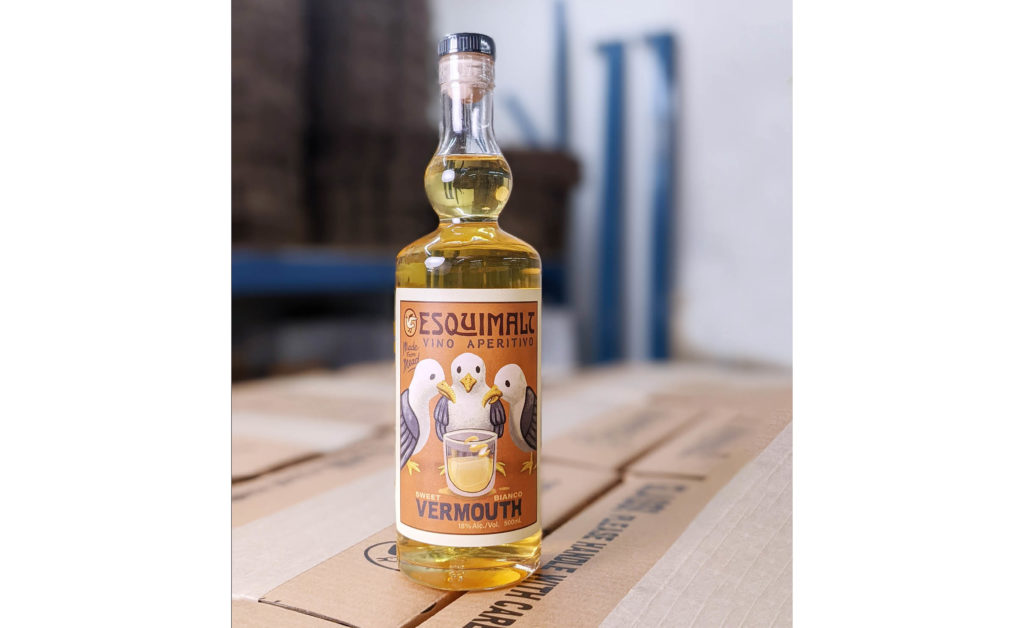by Tilar J. Mazzeo | photo courtesy Esquimalt Vermouth & Apéritifs –
What a delight in recent months to see an increasing number of Vancouver Island vermouths popping up in the liquor stores and on wine lists. If you’re a fan of cocktails from Martini to Negroni, you’ll already know about the pleasures of vermouth as an ingredient. A good vermouth, however, deserves some attention on its own merits – ideally served in a pretty little glass with a twist and maybe just one ice cube.
Vermouth dates back at least until Greek and Roman times, when it was used as a digestif. During that first winter of the pandemic time, as I have taken to thinking of these past years, I had the stir-crazy idea that I’d cook up a Roman saturnalia feast for the winter solstice, using ancient recipes, and all I can say about that experience is that, first: Roman food sure has come a long way in 2,000 years; and second: I’m not one bit surprised they needed digestives.
If you want to try your hand at making an ancient Roman-style vermouth, it’s surprisingly easy because vermouth is really nothing more than a table wine fortified with herb-and-spice-infused spirits. This is why any sensible winemaker is always going to produce a bit of vermouth. One of the realities of running a tasting room is that, at the end of the day, you are left with opened bottles of wine. Faced with a choice between pouring perfectly delicious wine down the drain or pouring the unused wine from those open bottles into a tank, fortified with some spirits to keep it fresh, vermouth is a mighty attractive prospect. When I was working as a winemaker, I’d just macerate a mad scientist blend of aromatics in some local craft vodka for a week or two, add a bit of sugar if we were making a sweet vermouth, and fortify the wine with the infused vodka. And that’s it: vermouth. Except, of course, there is an art to blending, and a good vermouth is a wonderful thing.
The base spirits used to make vermouth can vary. Neutral spirits like vodka are common, but some vermouths are made with brandy, and there’s no reason why you couldn’t use rye or any other base for your infusion. In theory, in fact, you could also make a fortified aromatic cider or mead. Locally, Esquimault Wine Company (www.esquimaltwine.ca) is doing just that using local Island mead as a base wine.
What really matters in a vermouth, after all, is the infusion. The aromatics can range anywhere from herbaceous and floral to highly spiced. For the Roman historian Apicius, the essential infusion was with frankincense; rosemary; saffron; a lavender-like aromatic known as nard or spikenard; and, of course, wormwood. I say “of course” wormwood because vermouth and wormwood go hand-in-hand. Indeed, the name vermouth is the French pronunciation of the German word for wormwood: wermuth. Other common aromatics in vermouth run the gamut from cinnamon or cloves to chamomile and orange peel.
You can make your own concoction with a bottle of wine, a bit of vodka, and a collection of herbs and spices, but there are many great options to explore as well coming out of island wineries. If your taste runs to the classical, Rathjen Cellars (https://tinyurl.com/6jfnpzft) offers a dry vermouth infused with roasted dandelion roots and marjoram. If you like something a bit sweeter, the folks at Beaufort Vineyard up in Courtenay make an off-dry wormwood-and-rosemary-led vermouth fortified with Sherringham vodka. Most of the Island tasting rooms are on a winter hiatus while everyone tries to get winter pruning done before the buds start pushing (and takes a breather), but winery pick-up is open throughout the winter.
While I hate recommending large-production products that come from off-Island when the economics of running a small land-based winery in this province are so challenging (that’s a rant for another day, but the legislation in British Columbia makes life very hard for small winemakers), one of my absolute favourite sipping drinks – not technically a vermouth only because of the absence of wormwood – is the surprisingly affordable French fortified wine, Lillet Blanc, which is infused with some secret recipe that smells to me like springtime flowers.




